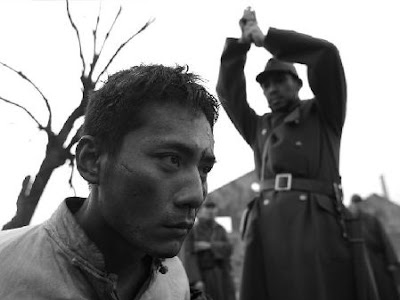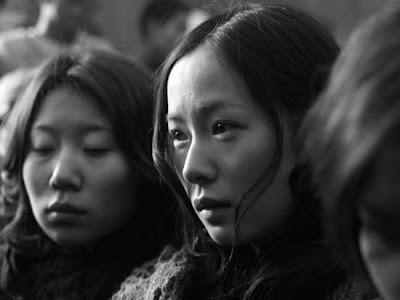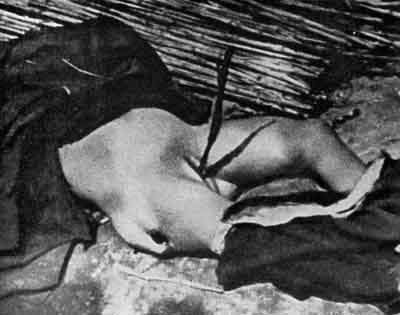I must be getting jaded.
City of Life and Death is not an easy film to watch. Not because of the tragedy involved but rather and strangely enough, precisely due to the lack of it.
Let me explain. The death, devastation, looting and rape are all there; but somehow the portrayal of these crimes seem sanitised - as though the producers were withholding the whole truth behind the Nanking Massacre.
Considering that the film was quite beautifully shot in stark black and white, City of Life and Death should have had all the right ingredients and elements to rival the likes Schindler's List and Saving Private Ryan.
Instead, the film somehow falls well short of greatness.
Mind you, I'm not saying that it is a bad film. It is good, and for a regular audience, possibly superb even. But it can be so much better. City of Life and Death just seemed to be missing a certain something.

Hideo Nakaizumi plays the sympathetic Japanese soldier.

Gao Yuanyuan gives a stirring performance as an administrator giving her all to protect civilians in the Nanking Safety Zone.

A limited but nonetheless memorable appearance by Liu Ye.

Jiang Yiyan as the prostitute who volunteers to be a comfort woman for the Japanese.

Fan Wei plays John Rabe's secretary; Qin Lan plays his wife; and John Paisley in a strangely small role as John Rabe - the Schindler of Nanking.
So what I did was to obtain a copy of Nanking, a documentary on the tragedy - notably made by non-Chinese.
What I saw blew me away. Not because of a higher production value - it was nowhere near that of City's - but because it pulled no punches. It revealed pictures that showed the full atrocity committed by the Japanese.
And just one single eye-witness account from the documentary beats the entire film - hands down.

Comfort women being carted away after 'use' in the film - it is not shown how they died after supposedly just three days.


The real faces of the Nanking Massacre - not what you get to see in City of Life and Death.
For the uninitiated (and those from outer space), City of Life and Death tells a story of the period of several weeks immediately after the Japanese occupation of Nanjing in 1937, the then capital of the Republic of China. The events of that period had since come to be known infamously as the Nanjing (or Nanking) Massacre.
One of the major criticisms of the film directed by Lu Chuan is the over sympathetic portrayal of the Japanese soldiers in the film.
While I had no problem with the character Kadokawa (Hideo Nakaizumi), a Japanese soldier who sympathises with the plight of the Chinese (ironically, Hideo pretty much plays the main lead, though the Chinese are loathe to admit it), I do take issue with how the rest of the Japanese are portrayed more like spoilt kids fighting over cookies (which in this case refers to the women of Nanjing).
The Japanese in this film might be cruel or sadistic (as children can be), but one word that cannot be used to describe them is 'vicious'. I can barely remember any moments in the film where a Japanese soldier was actually vicious. The producers have somehow contrived to take the 'viciousness' out of the film.
The problem I suspect is that the film has the 'Made in China' label attached to it.
The Chinese film industry is still at a fledgeling stage (not counting Hong Kong and Taiwan). The rating system in China, or lack thereof, means that censorship is a major issue to contend with. A film like Schindler's List (gas chamber scene) would never have passed the Chinese censors.
Perhaps it would be better to allow someone outside China to make the film instead.
Now that would have been a spectacle.
Moometer Reading:
Moo-oo...
